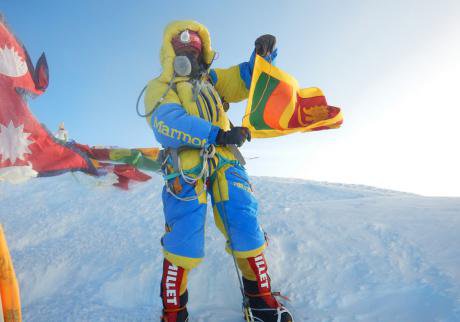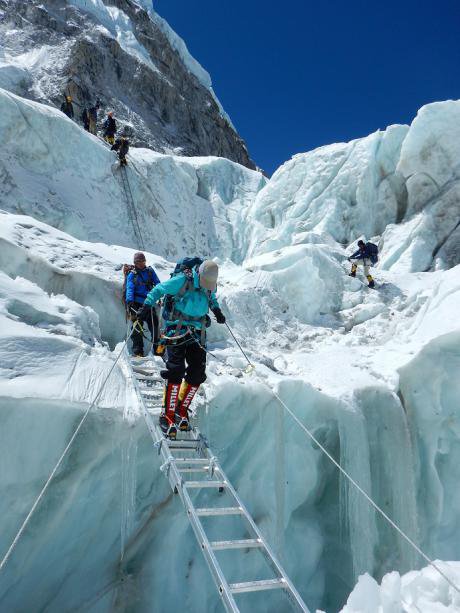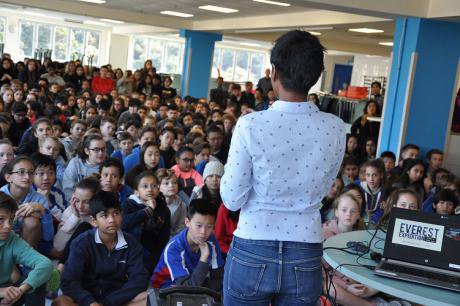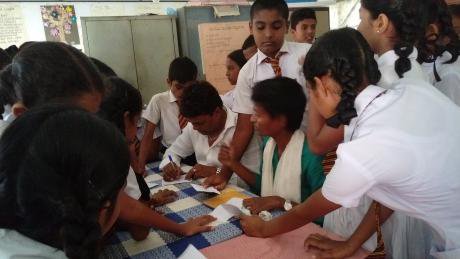
On the summit of Mount Everest. Photo: Sherpa Ang Karma.
On 21 May 2016, I became the first Sri Lankan to summit Mount Everest. It was a deeply personal journey and an overwhelming one. In fact, I almost didn’t make it. About a week earlier, I was sitting inside my tent at Camp 2 – at an altitude of 21,000 feet – discouraged and disappointed in myself. It was cold and windy. The temperature was minus 30 Celsius.
I had already failed to reach Camp 3, higher up the mountain, because of poor timing. I felt I had just one more chance, to prove myself. Failing again meant risking my journey to the top of the world and my childhood dream. As a feminist activist, I also didn’t want to prove right those who thought that, as a woman, I should never have attempted this challenge.
'Mountaineering is an extremely male-dominated sport.'Mountaineering is an extremely male-dominated sport. Later, I learnt that Sri Lanka is only the fourth country in the world – and the first in Asia – from which a woman has summited Everest before a man. The other three are Poland, Croatia, and South Africa. As of December 2016, a total of 4,469 people had summited Everest, of which 372 (less than 10%) were women.
It was after seeing these statistics that I realised why it had been so difficult to find appropriate high altitude clothes. I climbed Everest wearing an XS (extra small) men’s down suit, which was still too big for me. As for mountaineering boots: my feet are a UK size 4, but size 5 is the smallest on the market.
But I had to manage, as many of us do in a male-dominated world, where the playing field is seldom equal. And so I stuffed foam into my boots and went on.
Since summiting Everest, I have been invited to deliver motivational speeches including by companies, schools, clubs, associations and even the military. At some of these events, I have been referred to as the “first Sri Lankan woman” to have summited Everest, instead of the “first Sri Lankan” to have done so.
But would a man have been called the “first Sri Lankan man” to summit Everest?

Ladder crossing in the Khumbu Ice Fall. Photo: Sherpa Ang Karma.
It has always been important for me to question the labels placed upon us as women and girls. How are notions of beauty and femininity constructed? What alternatives are available to young women and girls in Sri Lanka?
Growing up, I was seen as ‘a tomboy,’ ‘like a boy’ or ‘masculine’ because of my love for climbing trees and scaling mountains. Close friends would warn me that I was developing biceps and triceps which made me look less feminine.
But I am proud to be a woman, and I am proud to say that I climbed Everest ‘like a girl’ – there’s nothing wrong about that and nothing to be ashamed of. Rather, I want to challenge the stereotype that "playing like a girl" is 'not good enough' or 'never strong enough'.
I hadn't expected to be seen as a ‘national heroine’ or a ‘celebrity’ after climbing Everest. But I have been inundated with requests to share my story. This has been as overwhelming as climbing this big mountain.

Jayanthi at the French International School, Hong Kong. Photo: Cecile Mayanobe.
The reception from other women has been the best part. During a corporate event in Colombo, a young woman said my story inspired her to follow her own dream to become a guitarist – despite teasing from male peers suggesting she play the violin instead (seen as a more ‘appropriate’ choice for a woman).
Another young woman I met at a different event last November dreams of one day winning the Nobel prize for physics.
Despite her passion for science and new discoveries, she said it is very difficult for her, as a woman, to find a job in Sri Lanka to match her interests and skills. On applying to one company, she said she was denied the post not because of required educational qualifications (which she possessed), but because the company wanted to hire a man instead.
Incidentally, the Nobel prize for physics, has been awarded to 203 individuals as of 2016 but only twice to women – Marie Curie and Maria Goeppert-Mayer – who also received their prize in partnership with a man.
'They had been taught by their (male) sports teacher that “boys are always first, girls are second.” I had proven him wrong.'
After talking at a rural school in Sri Lanka's north-western Kurunegala district, young school girls told me they were thrilled that I was the first Sri Lankan to summit Everest. They had been taught by their (male) sports teacher that “boys are always first, and girls are second.” I had proven him wrong.

Jayanthi at a school in Kurunegala district. Photo: courtesy of Jayanthi Kuru-Utumpala.
Everest changed my life. Personally, it taught me to believe in myself – which many women find hard to do as we are often told that we should not or cannot do certain things, because we are women. Professionally, it has allowed me to combine the two things that I’m deeply passionate about: gender equality and mountaineering.
I have embraced my public platform as the ‘first Sri Lankan’ and the ‘first Sri Lankan woman’ to summit Everest. This has been a conscious choice and I am trying to complicate narratives and challenge gender stereotypes and myths about women and what they can and cannot do. In the end, climbing Mount Everest has become a political act as well.
Read more
Get our weekly email
Comments
We encourage anyone to comment, please consult the oD commenting guidelines if you have any questions.